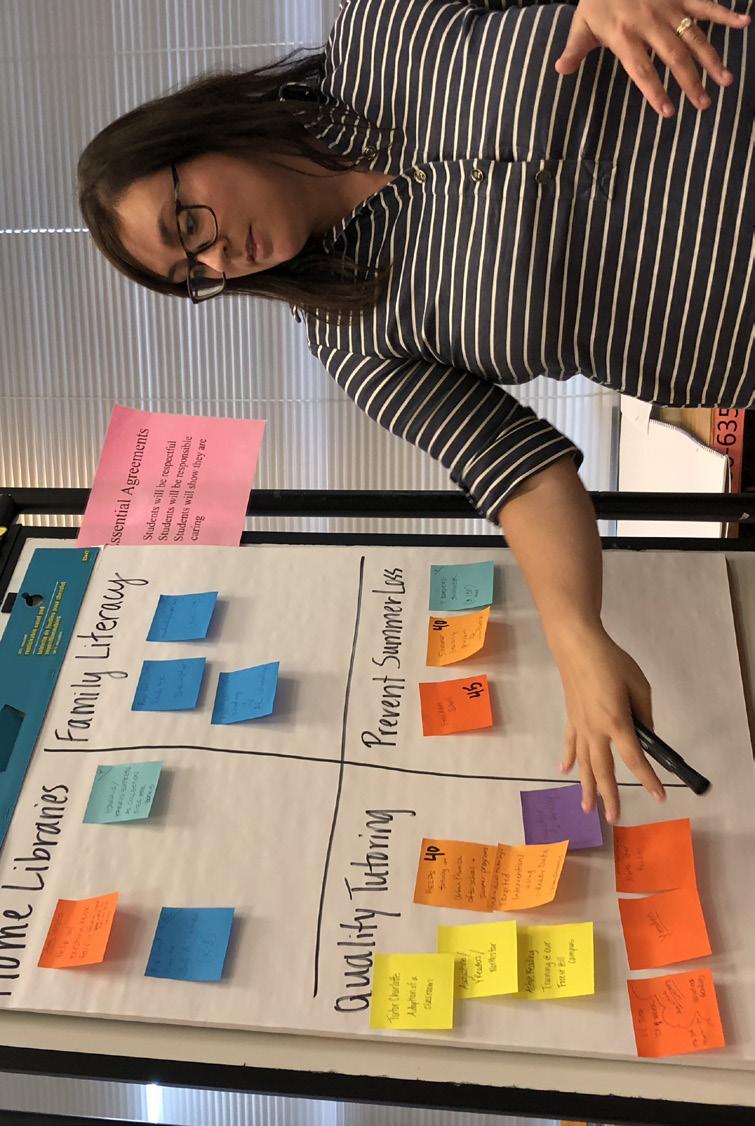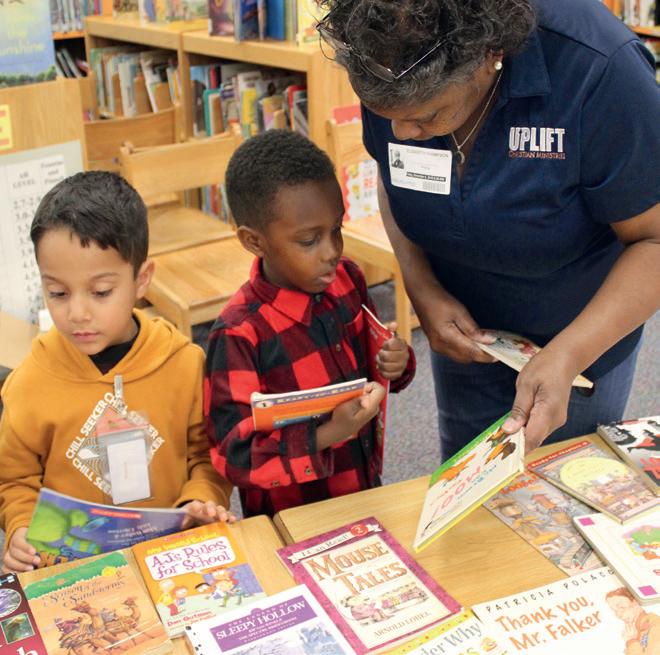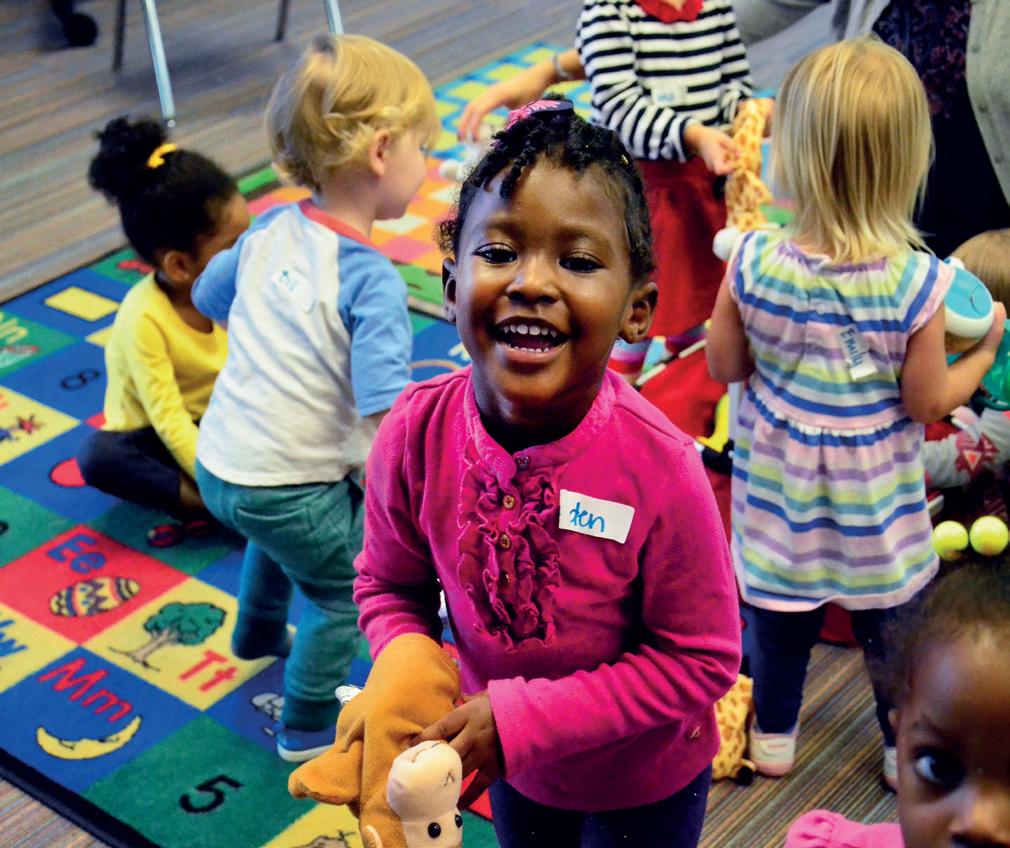
3 minute read
Insight: Alphabetic knowledge, early writing and oral language by the end of Kindergarten are among the strongest predictors of children’s reading ability in 1st and 2nd grade
Laying the Foundation for Impact: Systems Change 2015 - 2017
READY4K TEXTS
Introduced the evidence-based Ready4K text messaging program in Mecklenburg County. Sends tips and advice for families about things they can do at home to support language and literacy plus other areas of development starting at birth. Currently, almost 3,000 families receive text messages three times a week providing age-appropriate guidance on how to help their children. We are looking to scale Ready4K to serve an additional 10,000 families over the next three years.
We've sent nearly 1 million texts to local families.
READY TO READ DATA COLLABORATIVE
Developed and launched the Read Charlotte Data Collaborative, a community of practitioners that use data to continuously improve student language and literacy outcomes. Over the first two years of this three-year initiative, 10 nonprofit organizations have received 210 coaching sessions and 49 group trainings. We also doubled the number of organizations that set goals for student literacy outcomes, increased by eight-fold the number of organizations using evidence-based literacy practices, and collecting data on quality of program implementation, and quadrupled the number of datadriven continuous improvement cycles. We look forward to scaling these successful practices to other Read Charlotte-supported initiatives.
Wrote a business plan with Child Care Resources Inc. for Ready To Read, a three-year program to improve Pre-K children’s reading readiness by combining data, coaching, an evidence-based literacy curriculum and the evidencebased Raising A Reader booklending program. Secured over $2 million from a dozen funders for this effort. In the 2018-2019 school year, 484 children, 36 teachers and 22 child care centers participated. The 3-year olds and 4-year olds in the Ready To Read classrooms significantly outperformed children in comparison classrooms in targeted reading skills. Moreover, the teachers in Ready To Read classrooms demonstrated stronger literacy instructional practices. We are looking to repeat these results and successful practices in more Pre-K classrooms. SUMMER LITERACY INFUSION
Partnered with the YMCA of Greater Charlotte in 2017 to replicate a Summer Literacy Infusion model we discovered in Philadelphia in which children in summer camps get 1 hour of literacy four days a week. Over 1,850 children have been served over three summers (2017- 2019) at YMCA branches and through several community partners: Discovery Place, Parks and Recreation and the CMS After School Enrichment Program. Over the first three years, 95%, 74% and 85% of students avoided summer reading loss in summers 2017, 2018 and 2019 respectively.
READING MENTORS
Developed and launched the Tutor Charlotte Reading Mentors program in Fall 2017 in partnership with United Way of Central Carolinas. Modeled on the Lead to Read program in Kansas City, for two school years the United Way coordinated the recruitment of over 20 organizations who provided volunteers to read oneon-one with 633 Kindergarteners in nearly a dozen CMS schools. CharlotteMecklenburg Library provided training to volunteers in Active Reading, who read with whole classrooms of Kindergarteners for 30 minutes once a week. In summer 2019, Read Charlotte worked with Charlotte-Mecklenburg Schools to redesign the North Star Reading Partners curriculum to incorporate successful practices from Tutor Charlotte.
LITERACY PRACTICES STUDY
Partnered with Charlotte-Mecklenburg Schools on a study by Harvard Professor James Kim on classroom literacy practices in CMS. This report, Practices Matter: Major Findings from the CMS Teacher Literacy Survey, showed how CMS teacher classroom literacy practices were related to student reading outcomes. The report emphasized the importance of focusing on foundational literacy skills in Grades 1 and 2. It also pointed to the importance of fluency for students in higher poverty and Title I schools. The findings from this report provided the foundation for future Read Charlotte projects that focused both on classroom instruction and targeted tutoring.







